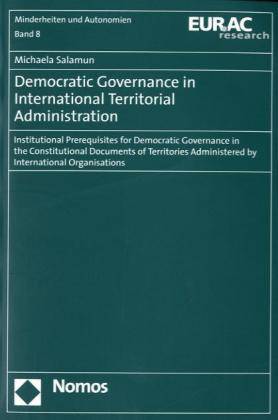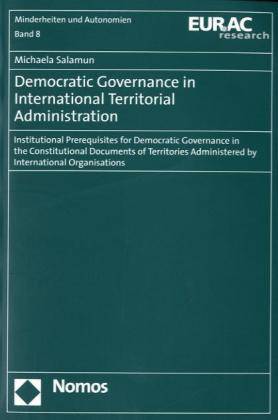
Door een staking bij bpost kan je online bestelling op dit moment iets langer onderweg zijn dan voorzien. Dringend iets nodig? Onze winkels ontvangen jou met open armen!
- Afhalen na 1 uur in een winkel met voorraad
- Gratis thuislevering in België vanaf € 30
- Ruim aanbod met 7 miljoen producten
Door een staking bij bpost kan je online bestelling op dit moment iets langer onderweg zijn dan voorzien. Dringend iets nodig? Onze winkels ontvangen jou met open armen!
- Afhalen na 1 uur in een winkel met voorraad
- Gratis thuislevering in België vanaf € 30
- Ruim aanbod met 7 miljoen producten
Zoeken
Democratic Governance in International Territorial Administration
Institutional Prerequisites for Democratic Governance in the Constitutional Documents of Territories Administered by International Organisations
Michaela Salamun
Paperback | Engels | Schriftenreihe der Europäischen Akademie Bozen, Minderheiten und Autonomien | nr. 8
€ 42,95
+ 85 punten
Omschrijving
This book analyses in a comparative way how and to what extent, the constitutional documents governing territories administered by international organisations (the League of Nations, the UN with the OSCE and the EU) have provided institutional prerequisites for democratic governance. Territories covered are the Free City of Danzig, the Saar Territory, the Territory of Leticia, the City of Jerusalem, the Free Territory of Trieste, the Congo, West Irian, South West Africa/ Namibia, Cambodia, Somalia, the City of Mostar, Eastern Slavonia, Bosnia and Herzegovina, the District of Brcko, East Timor and Kosovo.
The first Chapter discusses problematic issues in international territorial administration, such as evident in the problem of the delineation of the international personality of the territories, the applicability of the concept of democracy, and the enforceability of human rights. The second Chapter describes the legal framework for democratic governance by delineating the scope of the authority of governance conferred upon international organisations (and/or former states) and local institutions.
The third Chapter applies a framework for democratic governance to the constitutional documents by analysing to what extent they reflect basic principles of democracy, such as the separation of powers and the independence of the judiciary and the principle of popular sovereignty. The documents are also compared as to provision of mechanisms of accountability and judicial review, political rights and special participation rights for minorities in institutionalised decision-making processes. Finally, the fourth Chapter proposes ways by which governance in territories administered by international organisations can be democratised, such as by an increased transfer of powers and increased possibilities for popular participation in the government of the territory as well as by modifications to the institutional structures governing the territories.
The first Chapter discusses problematic issues in international territorial administration, such as evident in the problem of the delineation of the international personality of the territories, the applicability of the concept of democracy, and the enforceability of human rights. The second Chapter describes the legal framework for democratic governance by delineating the scope of the authority of governance conferred upon international organisations (and/or former states) and local institutions.
The third Chapter applies a framework for democratic governance to the constitutional documents by analysing to what extent they reflect basic principles of democracy, such as the separation of powers and the independence of the judiciary and the principle of popular sovereignty. The documents are also compared as to provision of mechanisms of accountability and judicial review, political rights and special participation rights for minorities in institutionalised decision-making processes. Finally, the fourth Chapter proposes ways by which governance in territories administered by international organisations can be democratised, such as by an increased transfer of powers and increased possibilities for popular participation in the government of the territory as well as by modifications to the institutional structures governing the territories.
Specificaties
Betrokkenen
- Auteur(s):
- Uitgeverij:
Inhoud
- Aantal bladzijden:
- 224
- Taal:
- Engels
- Reeks:
- Reeksnummer:
- nr. 8
Eigenschappen
- Productcode (EAN):
- 9783832916220
- Uitvoering:
- Paperback
- Gewicht:
- 340 g

Alleen bij Standaard Boekhandel
+ 85 punten op je klantenkaart van Standaard Boekhandel
Beoordelingen
We publiceren alleen reviews die voldoen aan de voorwaarden voor reviews. Bekijk onze voorwaarden voor reviews.











